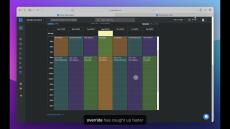|
By Kaushik Thirthappa
In 2024, we focused on operating at a very high speed. Every week was a lot of tiny releases, meeting with users, fulfilling user requests and focusing on simplicity. Still an incredibly small team (< 10) but tons of releases. 2025 is going to be great but before that let's glance on the year gone. Read the 2023 recap.
|
By Kaushik Thirthappa
Incident management is all about efficiently handling and resolving disruptions in IT services or business operations. It involves spotting, analyzing, and fixing any event that interrupts or could potentially disrupt critical services. The goal is to minimize downtime, keep service quality high, and ensure business continuity. This process includes documenting everything for future reference and improvement, helping organizations learn from past incidents and develop better response strategies.
|
By Kaushik Thirthappa
When things go wrong with your software systems, you need a reliable way to alert the right people and manage incidents. To help you make the best decision, we have summarized the G2 reviews of some of the most popular on-call management tools.
|
By Kaushik Thirthappa
Setting Up Incident Management in Slack Incident Response and Resolution Building a Custom Slack Incident Bot Roles and Responsibilities Optimizing Your Incident Management Process.
|
By Kaushik Thirthappa
In a DevOps setting, incident management is all about quickly identifying, analyzing, and fixing issues that disrupt IT services. Unlike traditional IT Service Management (ITSM), which often works in isolated teams, DevOps encourages collaboration between development, operations, and business teams. This teamwork ensures that when problems like server outages or software bugs occur, they are handled swiftly and effectively. DevOps incident management is all about being agile and flexible.
|
By Kaushik Thirthappa
On-call rotations are crucial for ensuring that technical teams are ready to tackle incidents, outages, or emergencies outside of regular hours. (Check our detailed guide on understanding on-call rotations in incident management). This system assigns specific team members to be available for immediate response, ensuring someone is always on duty to address critical issues.
|
By Kaushik Thirthappa
On-call rotation is a system where team members take turns being available to handle urgent issues outside regular working hours. This is crucial in fields like IT, healthcare, and customer service, where quick responses can greatly affect service continuity and customer satisfaction. The on-call engineer is tasked with diagnosing and fixing problems to minimize disruptions and maintain platform stability.
|
By Kaushik Thirthappa
Security incident response is all about how organizations handle and mitigate the effects of a security breach. It's a structured process that helps identify, contain, and recover from incidents, ensuring minimal damage and business continuity. This process involves several stages: preparation, detection, containment, eradication, recovery, and post-incident analysis. Each stage is crucial for tackling security threats and boosting an organization’s resilience against future incidents.
|
By Kaushik Thirthappa
4. Benefits of Using Incident Management Software 5. Trends to Watch in 2024 6. How to Choose the Right Software 7. Top Software Solutions for 2024 Conclusion: The Future of Incident Management Software.
|
By Kaushik Thirthappa
We're rolling out Playbooks, our latest in fully automating the incident response process. Imagine every action you (incident responders), had to manually take are now fully automated with Playbooks. Steps like initiating a war room (video conference), logging incidents, sending out alerts, and running diagnostic scripts are now executed with precision, every single time, are all now effortlessly automated without you lifting a finger.
|
By Spike
Today, we are bringing enhancements to on-call overrides. For many remote teams using Spike, we are addressing the need to manage overrides across multiple time zones. This new design makes it easy to see override times in the local time of the person taking over. It adds clarity and helps you be mindful about on-call times. We also focus on clearly showing who is taking over on-call duties, enhancing overall management and coordination.
|
By Spike
"🚀 Automate Your Status Pages with Playbooks! 🚀 In this video, we're diving deep into the world of incident response automation. Join us as we explore how you can streamline your status page updates with Spike's powerful Playbooks feature. Learn step-by-step how to create and configure Playbooks to automate your status page notifications, ensuring your stakeholders are always kept in the loop during incidents. With a live demo and practical insights, you'll discover how easy it is to set up automated responses tailored to your organization's needs.
|
By Spike
Discover how simple it is to set up automated responses, saving you valuable time during critical incidents. Say goodbye to manual updates and hello to effortless automation!
|
By Spike
Playbooks are a powerful tool to automate common actions in your incident response process. It's like a pre-programmed sequence of steps your team should take when specific incidents occur. Instead of scrambling to remember protocols or manually initiating a series of tasks, responders can activate a Playbook with a single click. This triggers a predefined set of actions, such as notifying team members, setting incident severity/priority, or creating support tickets, all tailored to the nature of the incident.
|
By Spike
Explore the efficient setup of a Follow-the-Sun on-call model using Spike.sh. This video provides a step-by-step guide for tech professionals to implement this global, time-zone-optimized on-call strategy seamlessly. Enhance your team's responsiveness and reduce burnout with our expert tips and insights. Perfect for IT and DevOps teams aiming for 24/7 incident management without compromising on efficiency.
|
By Spike
Here is On-call 3.0, the result of your feedback, deep examination, and fundamental improvements that makes on-call a better day to day experience.
|
By Spike
Welcome to Spike.sh’s Microsoft Teams bot! At the heart of every successful team lies efficient communication and swift problem resolution. That’s precisely what our bot brings to the table – a dynamic toolset that empowers you to tackle incidents seamlessly. Features: Our new Microsoft Teams bot alerts are not only prompt but also smartly updated as the situation develops. It achieves this by seamlessly integrating incident management into Microsoft Teams, providing you with real-time alerts the moment an incident surfaces.
|
By Spike
Learn how you can get a phone call alert when your API fails. Spike.sh sends you alerts via phone call, SMS message, email and Slack when you have any issues in production. Spike.sh integrates with your infrastructure, performance monitoring, error tracking, uptime monitoring, API monitoring and cron job monitoring tools. Our integrations include AWS, Google Cloud, Datadog, Grafana, Prometheus, New Relic and many more.
|
By Spike
Learn how you can get a phone call alert when your cron job fails. Spike.sh sends you alerts via phone call, SMS message, email and Slack when you have any issues in production. Spike.sh integrates with your infrastructure, performance monitoring, error tracking, uptime monitoring, API monitoring and cron job monitoring tools. Our integrations include AWS, Google Cloud, Datadog, Grafana, Prometheus, New Relic and many more.
- January 2025 (1)
- December 2024 (6)
- November 2024 (2)
- June 2024 (1)
- April 2024 (4)
- February 2024 (5)
- January 2024 (2)
- December 2023 (1)
- November 2023 (1)
- October 2023 (3)
- September 2023 (3)
- May 2023 (2)
- April 2023 (1)
- January 2023 (1)
- September 2022 (3)
- July 2022 (1)
- March 2022 (1)
- December 2021 (1)
- November 2021 (1)
- September 2021 (1)
- August 2021 (2)
- April 2021 (11)
- March 2021 (6)
- February 2021 (2)
With unlimited alerts and integrations, Spike helps you bring clarity in incidents and decrease resolve time with complete transparency.
Gain customer confidence with every incident. We alert you of your incidents before your customers do. Stop losing customer faith in IT outage. Spike helps you bring clarity in incidents and decrease resolve time with complete transparency. Spike aims make it simple by un-complicating the platform with our enhanced features. Real-time platform health, easy escalation policies, suppressing repeat incidents, activity logs and more.
Features you will actually use:
- Group repeat incidents: Incidents which are repeated are automatically grouped together telling you how many times it has occurred along with it's first occurrence and last occurrence.
- Mute incidents: Mute an incident for a period of time, we will not send any alerts but still create an incident and group them too.
- Auto resolve incidents: Our integrations make sure that incidents are resolved automatically on Spike when they are fixed on your monitoring tool.
- Unlimited services: Come full circle by adding incident tracking to all your services. Scope your incidents, reports and health of each service.
- Affected services: Monitor the services which are affected the most by open incidents. Prioritise and resolve to increase customer satisfaction.
- Simple escalation policies: Alert one or more persons at the same time. Alert via phone preferred channel to every team member with time intervals.
- Unlimited alerts: We provide you unlimited alerts across all the supported channels. No more predicting your monthly billing cycle.
We alert you of your incidents via Phone call, SMS, Slack and Email before your customers do.




















